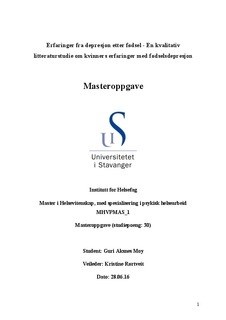| dc.contributor.advisor | Rørtveit, Kristine | |
| dc.contributor.author | Moy, Guri Aksnes | |
| dc.date.accessioned | 2016-09-22T07:53:47Z | |
| dc.date.available | 2016-09-22T07:53:47Z | |
| dc.date.issued | 2016-06-28 | |
| dc.identifier.uri | http://hdl.handle.net/11250/2409661 | |
| dc.description | Master's thesis in Health and social sciences | nb_NO |
| dc.description.abstract | Background: Depression is the most common complication after birth. Postpartum depression is depression that occurs after childbirth. In Norway there are about 60,000 births a year. Between 10-15% of postpartum women get postpartum depression. That is between 6000-9000 women each year experience some form of postpartum depression. We distinguish three psychiatric complications after childbirth, postpartum tears, postpartum depression and postpartum psychosis. This study will focus on postpartum depression.
Aim: The aim of this study is to shed light on women's experiences, and provide a systematic overview of the topic Postpartum Depression, as described in qualitative research literature.
Problem: How do women describe their experiences with postpartum depression?
Method: This method is a systematic qualitative literature study where it examined a collection of qualitative articles, which deal with women's experiences from a lived through postpartum depression. Analysis of the articles will be carried out using a qualitative content analysis.
Result: The main theme Dark puerperium - mothers struggle between happiness and postpartum depression, was developed and described by two topics; Missing a sense of empowerment and Mamma shock, expectations and realities. These were further described in seven sub-topics.
Conclusion: Women`s experiences with being depressed after birth is described as a time marked by a lack of a sense of empowerment in the face of everyday challenges that they have previously mastered. It is also a time of little correlation between the created expectations and realities these women face. If women can become aware of their automatic thoughts associated with depression, this can help them to change thought patterns to think in a more realistic way, and change the remission from depression. Women experience postpartum depression may in many ways be categorized, since many of them have experiences similar to each other. On the other hand, the compositions of these experiences are often different, and are unique to the individual woman. | nb_NO |
| dc.language.iso | nob | nb_NO |
| dc.publisher | University of Stavanger, Norway | nb_NO |
| dc.relation.ispartofseries | Masteroppgave/UIS-SV-IH/2016; | |
| dc.subject | helse- og sosialfag | nb_NO |
| dc.subject | fødselsdepresjon | nb_NO |
| dc.subject | psykisk helsearbeid | nb_NO |
| dc.title | Erfaringer fra depresjon etter fødsel - En kvalitativ litteraturstudie om kvinners erfaringer med fødselsdepresjon | nb_NO |
| dc.type | Master thesis | nb_NO |
| dc.subject.nsi | VDP::Medical disciplines: 700::Clinical medical disciplines: 750::Psychiatry, child psychiatry: 757 | nb_NO |
